As former fossil fuel workers, we’ve seen friends and former colleagues lose their jobs in layoff after layoff. After years of watching the boom and bust cycle in the oil patch, you’d think we’d be used to it – but you never get used to watching people you care about lose their livelihood.
Canadian energy workers see the writing on the wall: they know that Canada’s economy is changing and that fossil-fuel-dependent jobs are vanishing. Iron & Earth was founded by and for fossil fuel workers. Last month, our organization released an Abacus Data poll showing that more than two-thirds of fossil fuel workers believe Canada needs to address climate change, and 61% believe Canada needs to pivot to a net-zero economy.
We were encouraged that the federal government launched an engagement process this summer asking Canadians “how the Government of Canada can ensure a just and equitable transition to a low-carbon future for workers and their communities.” That Just Transition program could offer an opportunity to build a better future for energy workers and all Canadians if the federal government follows through and implements what workers need to thrive in the net-zero economy.
We welcome the platform promise announced by the Trudeau government in late August of a $2-billion investment towards making the just transition a reality, and hope that all political parties vying for office will also commit funding to taking Canada forward into a net-zero economy. Iron & Earth is calling for a $61-billion federal investment in Canada’s just transition. It might seem like a big-ticket item, but that’s the scale needed for Canada’s energy future to be inclusive and viable – to help fossil fuel workers, their families and communities across Canada prosper in the transition to a net-zero economy, and to ensure that no one is left behind.
Iron & Earth’s recently released Prosperous Transition Plan provides a blueprint for how to get there. We outline essential steps for the federal government to achieve net-zero by 2050 – steps that are backed by five years of consultations, interviews, surveys and Canada-wide polls with fossil fuel industry and Indigenous workers.
Here’s how more than 80% of fossil fuel workers believe the federal government should invest $61 billion to build a just transition. All political parties vying for federal office need to embrace this platform:
- Support upskilling of more than one million workers. Our recent poll shows that fossil fuel workers have the desire to work in the net-zero economy, and they have the core technical foundation. But they need training – and without a strong and capable workforce, it will be impossible for Canada to rise to the challenge of the economic transformation that must begin now. Federal investment: $10 billion over 10 years to support rapid upskilling of more than one million workers at a cost of $10,000 per trainee.
- Enable rapid refocusing and repositioning of 10,000 Canadian enterprises to meet the emerging demand in net-zero industries. Help pivot Canadian businesses to participate in a net-zero carbon economy while supporting supply-chain retooling of manufacturing, critical material extraction and materials-processing capabilities. Support the retool and upgrade of business facilities to extend production capability, and support contractors, consultants and service providers so they can position themselves competitively in the net-zero economy. Federal investment: $20 billion over 10 years to support the rapid repositioning of 10,000 Canadian enterprises.
- Promote retrofitting and repurposing initiatives to reduce the carbon intensity for long-term infrastructure. Oil and gas pipelines can be repurposed to extract resources like helium and lithium, and aging or decommissioned infrastructure, such as abandoned and orphaned drill-wells across Canada, for solar energy projects, enabling the use of otherwise fallow land and focusing on the remediation of inactive wells. Federal investment: $10-billion equivalent in the form of incentives and tax offsets, with green strings to carbon-intensive industries investing in net-zero technologies.
- Prioritize nature-based solutions. These projects – ranging from forest protection and restoration initiatives, to incorporating natural ecosystems into industrial operations – have the potential to simultaneously address social challenges while building resilience into the economy and revitalizing ecosystems. Federal investment: $22 billion over 10 years to prioritize developing green infrastructure, expanding carbon sinks and revitalizing ecosystems and biodiversity.
Each of these are interconnected processes, and they must happen simultaneously if they are going to be successful. We can’t have a thriving net-zero economy without a workforce trained to work in net-zero jobs. But workers won’t be inspired to (re)train unless they know there are jobs available after their retraining is complete.
Transforming our economy to one powered by low- or zero-emission energy sources will require significant investment. But it will be money well spent to ensure Canada remains a competitive energy economy while meeting our international obligations to mitigate climate change. As August’s landmark Intergovernmental Panel on Climate Change report on the impacts of carbon emissions shows, we can still limit warming to 1.5°C – but we need to act urgently. As economies around the world embrace emission-reduction technology, Canada risks being left behind unless we transition rapidly and at a massive scale.
The time for transition is now, and as our poll shows, fossil fuel workers are ready to mobilize – the majority believe Canada should pivot to a net-zero economy.
As former fossil fuel workers ourselves, we know change can be challenging and nerve-wracking, but we have reasons for optimism. The transition to net-zero will deliver a new and exciting future with fulfilling jobs no longer tied to boom-bust cycles.
Canada has the technologies, the people and the skills to thrive in a net-zero world. Now we need bold, multi-party action from the government, not simply to weather the storm, but to get ahead of it by creating effective policies and delivering the investment funds needed to create hundreds of thousands of well-paid, stable and durable jobs. Canada’s energy workers have spoken. Let’s hope the next federal government listens.
Luisa Da Silva is the executive director of Iron & Earth. Bruce Wilson is chair of the board of Iron & Earth.





